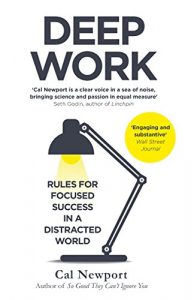
Definition of Deep Work– According to the author, deep work is the “state of distraction-free concentration that push your cognitive capabilities to their limit. These efforts create new value, improve your skill, and are hard to replicate.”
Opposite of Deep Work is Shallow Work: The author defines shallow work as “noncognitively demanding tasks”which require very little concentation and can be done even while being distracted. This sort of work is simple to replicate.
This book revolves around the idea that deep work is becoming very rare which means it is becoming extremely valuable. The need to look visibly busy is what causes people to disregard deep work.
Essentials of Deep Work:
- Single-tasking :Believe it or not, but numerous researches have proven that multitasking actually makes people less productive. Multitasking may maximize productive output but not overall productivity.
- Zero distractions:No need for explanation here. Both the quantity and quality of work increase when there are no distractions.
- Extreme Focus:If you can muster up all the energy into the desired task without any distraction, you can get a lot more work done in lesser time. More focus equals more productivity.
Be mindful of Attention Residue:
- Attention residue is the reason why deep working for long periods of time is more efficient and productive.
- This is based on the concept that when we switch from one task to another, our mids often remains stuck thinking about the previous task thereby reducing attention from the present task. Therefore, working deep on a single task avoids this effect.
Deep Work is a skill:
- According to the author, deep work is a skill that can be developed over a period of time. Just like any other habit, deep work can be learnt through constant practice.
- Do not expect to get it correct the first time around. With practice, you will be able to increase output and productivity through deep work.
Rules of Deep Work:
- Work deeply: Systemize and organise your actions. What time? what place? how long? what to do? how to do it? etc.Create a system of deep work and define all these parameters beforehand..Cut out all distractions. You will only be able to achieve deep work if you are willing to put the effort to eliminate all distractions that surround you during work.This could be a place, time or both. Put maximum effort into finding an environment that allows you to perform the deepest work.
- Embrace Boredom:We are tempted to make you of the internet to fulfil our urge for distractions. Restrict yourself from it. Over time you will develop resistance to such urges.Learn to meditate. Train your brain to focus more especially mentally. This will sharper concentration.
- Quit Social Media:If it doesn’t help you in any way, leave it. If it supports your task, make use of it. Keep a note on how you spend time on social media.You can’t achieve deep work while constantly having the desire to hop on socials.
# Key Takeaways:
– Deep work is the ability to focus without distraction on a cognitively demanding task.
– It is becoming increasingly rare in today’s world due to the rise of technology and constant connectivity.
– Deep work is valuable because it allows individuals to produce high-quality work and achieve their full potential.
– To achieve deep work, one must eliminate distractions and create a conducive environment for concentration.
– The ability to concentrate deeply is a skill that can be developed through deliberate practice.
– Deep work requires a balance between intense focus and rest, as the brain needs time to recharge.
– Shallow work, such as responding to emails and attending meetings, should be minimized to make room for deep work.
– The ability to perform deep work is becoming a valuable asset in the job market.
# Practical Application:
– To apply the concept of deep work in real-world scenarios, individuals can start by identifying their most important tasks and setting aside dedicated time to work on them without distractions.
– Creating a distraction-free environment, such as a quiet workspace or using productivity tools, can also aid in achieving deep work.
– Leaders and managers can encourage deep work in their teams by setting clear expectations and providing resources for focused work.
– Companies can also implement policies that limit distractions, such as no-meeting days or designated quiet hours.
# Valuable Insights for Leaders and Managers:
– Chapter 2: “Deep Work Is Rare” highlights the importance of deep work in today’s economy and the potential benefits for organizations.
– Chapter 3: “Deep Work Is Meaningful” discusses how deep work can lead to a sense of fulfillment and satisfaction in one’s work.
– Chapter 4: “Deep Work Is Hard” emphasizes the need for deliberate practice to develop the skill of deep work.
– Chapter 5: “Deep Work Is Valuable” explores the economic value of deep work and how it can give individuals a competitive advantage.
# Case Studies and Examples:
– The author, Cal Newport, shares his personal experience of implementing deep work in his academic career and how it helped him achieve success.
– The book also includes examples of individuals and organizations who have embraced deep work and achieved significant results, such as Bill Gates and the company Basecamp.
– The concept of “productive meditation” is illustrated through the example of Brian Little, a Harvard psychologist who uses his daily walks to think deeply about his research.
Overall, Deep Work offers valuable insights and practical strategies for individuals and organizations to achieve deep work and reap its benefits. It is a must-read for anyone looking to improve their focus and productivity in today’s fast-paced world.
Leave a Reply